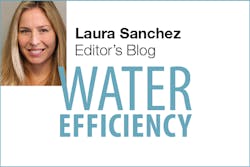As water scarcity becomes an increasingly grave global threat, efficient new ways to treat, reuse, and replenish the available water supply become more important. A recent study has determined that engineered polymer membranes may represent progress toward a solution, since they offer heightened filtration and varied pore selectivity for water treatment applications.
Researchers at the University of Notre Dame and Purdue University studied self-assembled block polymer membranes, which allow for both customizable and uniform pore sizes, as a platform for water treatment systems. Their report, published in Nature Partner Journals — Clean Water, finds that filtration systems based on these engineered polymer membranes show the potential to propel water treatment technologies forward.
“Most state-of-the-art membranes for water treatment are designed to let water pass through while filtering contaminants,” said William Phillip, associate professor in the Department of Chemical and Biomolecular Engineering at Notre Dame, in a statement. “This approach limits the ability to remove or recover dissolved species based on their chemical identity.”
Phillip and the research team were able to engineer the chemical properties of the polymer to reduce pore size and design pore wall chemistries for highly selective, solute-specific separation. This means that the membranes are customizable to specific water treatment needs.
“The exciting thing about self-assembled block polymer membranes is that you can engineer the nanostructure and pore wall chemistry of the membrane through the design of the block polymer molecules. This capability has the potential to open up a variety of new separation mechanisms that can isolate species based on chemical identity, which in turn could help to enable decentralized reuse of wastewater.”
Though still in its infancy, this technology could address an array of water filtration needs since it can be tailored for specific treatment applications. It could have a beneficial global impact. What experiences have you had with membranes? Do you think that engineered polymer membranes represent a step forward for filtration technology?
